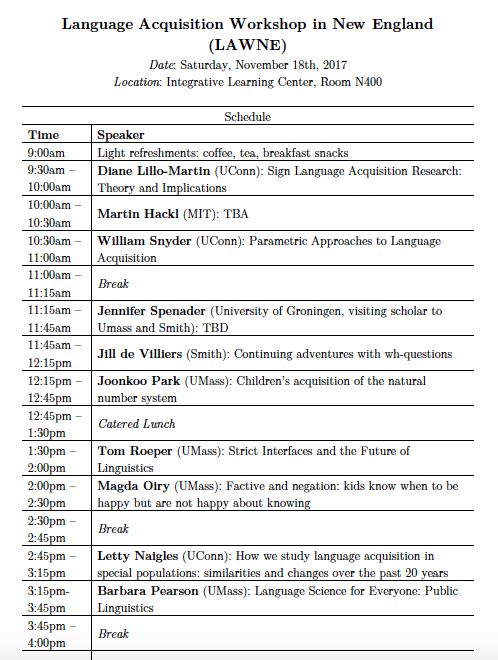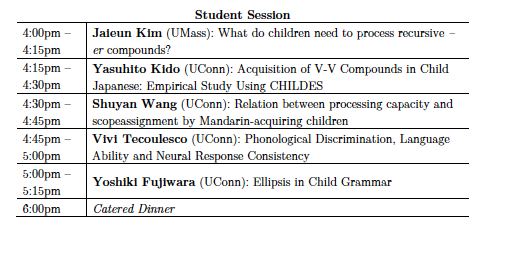Ever since Quine’s “On What There Is”, discussions of the types of variables in natural languages have occupied a special place in semantics. According to Quine, “to be assumed as an entity is, purely and simply, to be reckoned as the value of a variable.” After eleven years in the archives, Meredith Landman’s landmark 2006 dissertation on Variables in Natural Language has now been made publicly available on ScholarWorks. Landman’s dissertation argues for severe type restrictions for object language variables in natural languages, targeting pro-forms of various kinds, elided constituents, and traces of movement.  In his 1984 UMass dissertation Gennaro Chierchia had already proposed the ‘No Functor Anaphora Constraint’, which says that ‘functors’ (e.g. determiners, connectives, prepositions) do not enter anaphoric relationships. Landman’s dissertation goes further in arguing for a constraint that affects all object language variables and also rules out properties as possible values for them. Her ‘No Higher Types Variable Constraint’ (NHTV) restricts object language variables to the semantic type e of individuals. Landman explores the consequences of the NHTV for the values of overt pro-forms like such or do so, as well as for gaps of A’-movement and for NP and VP ellipsis. Since the NHTV bars higher type variables in all of those cases, languages might have to use strategies like overt pro-forms or partial or total syntactic reconstruction of the antecedent to interpret certain types of movement gaps and elided constituents. The NHTV thus validates previous work arguing for syntactic reconstruction and against the use of higher-type variables (e.g. Romero 1998 and Fox 1999, 2000), as well as work arguing for treating ellipsis as involving deletion of syntactic structure. The topic of the type of traces has most recently been taken up again in Ethan Poole’s 2017 UMass dissertation, which contributes important new evidence confirming that the type of traces should indeed be restricted to type e. (This post was crafted in collaboration with Meredith Landman, who also provided the pictures).
In his 1984 UMass dissertation Gennaro Chierchia had already proposed the ‘No Functor Anaphora Constraint’, which says that ‘functors’ (e.g. determiners, connectives, prepositions) do not enter anaphoric relationships. Landman’s dissertation goes further in arguing for a constraint that affects all object language variables and also rules out properties as possible values for them. Her ‘No Higher Types Variable Constraint’ (NHTV) restricts object language variables to the semantic type e of individuals. Landman explores the consequences of the NHTV for the values of overt pro-forms like such or do so, as well as for gaps of A’-movement and for NP and VP ellipsis. Since the NHTV bars higher type variables in all of those cases, languages might have to use strategies like overt pro-forms or partial or total syntactic reconstruction of the antecedent to interpret certain types of movement gaps and elided constituents. The NHTV thus validates previous work arguing for syntactic reconstruction and against the use of higher-type variables (e.g. Romero 1998 and Fox 1999, 2000), as well as work arguing for treating ellipsis as involving deletion of syntactic structure. The topic of the type of traces has most recently been taken up again in Ethan Poole’s 2017 UMass dissertation, which contributes important new evidence confirming that the type of traces should indeed be restricted to type e. (This post was crafted in collaboration with Meredith Landman, who also provided the pictures).
Monthly Archives: November 2017
Video of Rickford talk and discussion Weds. Nov. 14 at 7 p.m. in Amherst
A video of John Rickford’s talk “Fighting Dialect Prejudice in the courtroom and beyond”, which he presented as last year’s Freeman lecture, will be shown at the Unitarian Universalist Society of Amherst 121 N. Pleasant St, Amherst Wednesay November 15, 2017 at 7 p.m. Joe Pater will facilitate a discussion on dialect prejudice following the screening. Free and open to the public.
20th LAWNE on Saturday, November 18 @ UMass
Join us on Saturday for the 20th anniversary of LAWNE (Language Acquisition Workshop New England)


The 20th Anniversary of LAWNE (Language Acquisition Workshop of New England)
The 20th Anniversary of LAWNE (Language Acquisition Workshop of New England), our local language acquisition workshop involving UMass, UConn, Smith, and MIT, will be held at UMass on Saturday, November 18th.
This semester, we will be celebrating the 20th anniversary of our workshop by having a talk series led by faculty members of the participating schools. Talks will be about open questions/areas for research in the field of acquisition with the focus of what has been done (to celebrate our 20th anniversary) and what still needs to be done (for the next 20 years). A full schedule can be found at the end of this post.
- Faculty presenters:
- UMass – Tom Roeper & Magda Oiry
- UConn – Diane Lillo-Martin, William Snyder, & Letty Naigles
- Smith – Jill de Villiers
- MIT – Martin Hackl
In addition to special talks, there will be faculty/student presentations on their ongoing work in acquisition during lunch and dinner.
Coffee and breakfast will be served from 9:30am, and the first talk will start from 10:00am. lunch, and dinner will also be provided through funding from LARC at UMass and the UConn department.
If you have any questions about the event or how to RSVP, please contact Jaieun at jaieunkim@linguist.umass.edu
All are welcome!
Honorary Degree for Barbara Partee
 From UvA news: On January 8, the University of Amsterdam will award an honorary degree to Barbara for her contribution to the development of formal semantics in natural language. “Partee played a crucial role in the development of formal semantics of natural language. Partee’s influence in this domain of linguistics continues to be considerable. Formal semantics emerged in the 1960s and 1970s at the intersection of various disciplines. Initial ideas that were essential to the development of formal semantics were developed by logicians and philosophers, especially Richard Montague and David Lewis. Partee, a linguist trained in the tradition of transformational generative grammar (she obtained her PhD under the supervision of Noam Chomsky), was the first linguist to realise the importance of these ideas for the development of semantics within linguistic theory. Not only did she strongly promote the acceptance of formal semantics within linguistics and work to foster the cooperation of logicians, philosophers, and linguists, but also made many substantial contributions to the development of this domain. For example, Partee compiled the first series of articles, including her own, written by logicians and linguists about Montague Grammar, the leading model for formal semantics in the 1970s.” This is Barbara’s fifth honorary doctorate: she is already holding honorary degrees from Swarthmore College, Charles University in Prague, Copenhagen Business School, and the University of Chicago.
From UvA news: On January 8, the University of Amsterdam will award an honorary degree to Barbara for her contribution to the development of formal semantics in natural language. “Partee played a crucial role in the development of formal semantics of natural language. Partee’s influence in this domain of linguistics continues to be considerable. Formal semantics emerged in the 1960s and 1970s at the intersection of various disciplines. Initial ideas that were essential to the development of formal semantics were developed by logicians and philosophers, especially Richard Montague and David Lewis. Partee, a linguist trained in the tradition of transformational generative grammar (she obtained her PhD under the supervision of Noam Chomsky), was the first linguist to realise the importance of these ideas for the development of semantics within linguistic theory. Not only did she strongly promote the acceptance of formal semantics within linguistics and work to foster the cooperation of logicians, philosophers, and linguists, but also made many substantial contributions to the development of this domain. For example, Partee compiled the first series of articles, including her own, written by logicians and linguists about Montague Grammar, the leading model for formal semantics in the 1970s.” This is Barbara’s fifth honorary doctorate: she is already holding honorary degrees from Swarthmore College, Charles University in Prague, Copenhagen Business School, and the University of Chicago.
Lisa Green at the Arctic University of Norway
 Lisa Green was an invited speaker at the Workshop on Structural and Developmental Aspects of Bidialectalism in Tromsø, Norway. Her session chair was alum Andrew Weir from NTNU in Trondheim (2014 UMass PhD). Lisa talked about Variation and Development: The Question about Bidialectalism and Co-Existent Systems in African American. From the abstract for her talk:
Lisa Green was an invited speaker at the Workshop on Structural and Developmental Aspects of Bidialectalism in Tromsø, Norway. Her session chair was alum Andrew Weir from NTNU in Trondheim (2014 UMass PhD). Lisa talked about Variation and Development: The Question about Bidialectalism and Co-Existent Systems in African American. From the abstract for her talk:
“One view of African American English (AAE) is that it is a variety that consists of two components, one that reflects the properties of general American English and an African American component that is the locus of properties that distinguish AAE from other varieties of English (Labov 1998). The general English component is a complete grammar, but the African American component is an additive. The implicit assumption that accompanies the dual components view of AAE is that speakers of AAE are bidialectal. In the first part of the paper, I explain the pitfalls of a dual components approach to the study of AAE, especially the types of predictions it makes about the status of AAE speakers as bidialectal and as codeswitchers between AAE and general American English. In the second part of the paper, I explore claims about dual components and bidialectalism from the perspective of data from the tense/aspect system of AAE. I discuss patterns in the development of the copula system and morphological marking of verbs in third person singular contexts, which raise questions about the development of variation within the AAE system, on the one hand, and shared properties with other varieties of English on the other.”
Rong Yin at BUCLD 42
Rong Yin presented “The Person Asymmetry in Agreement in ‘What BE…?’ Questions in English” at this year’s Boston University Conference on Language Development, where she also received the conference’s Paula Menyuk Travel Award! Congratulations, Rong!
UMass Linguists in Iceland
From Angelika Kratzer: The 48th Annual Meeting of the North East Linguistics Society took place at the University of Iceland in Reykjavik this year. Alum Jóhannes Gísli Jónsson was one of the organizers. Ten current or former UMass linguists presented papers and posters for three days. Here is a link to the full program with abstracts, slides or handouts for each talk. On the first picture collage below are: Jóhannes Gísli Jónsson, myself, Cherlon Ussery, co-organizer and former UMass visitor Matthew Whelpton, Petr Kusliy, Ethan Poole, Stefan Keine, and Kyle Rawlins. On the second picture collage are: Erika Mayer, Bernhard Schwarz, Jon Ander Mendia, and Andrew Weir.





